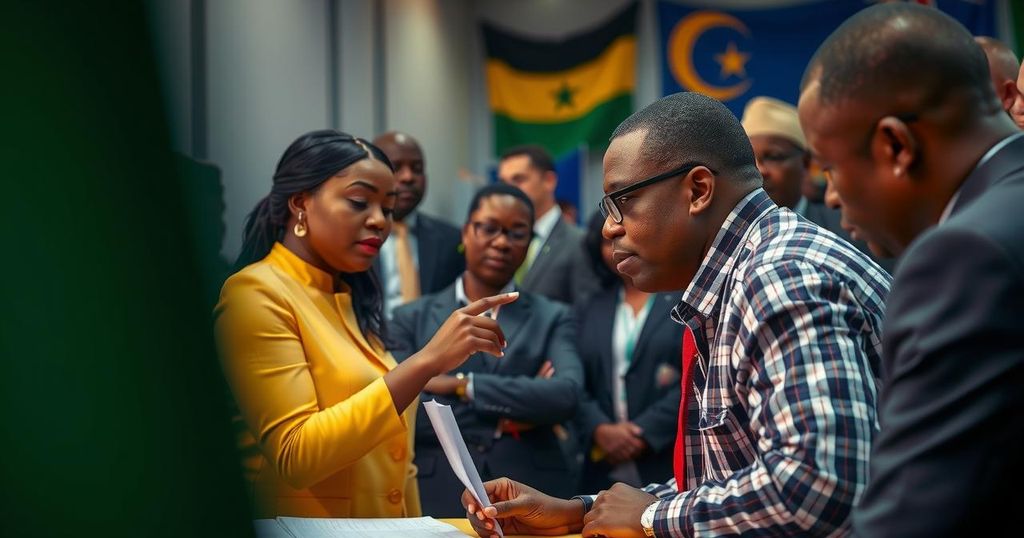World news
ACCRA, AFRICA, BEDIAKO, CHEDDAR, DEMOCRACY, ELECTORAL PROCESS, GHANA, GOVERNANCE, GOVERNMENT, JOHN TADEN, LOS ANGELES, MAHAMUDU BAWUMIA, NATIONAL DEMOCRATIC CONGRESS, NEW PATRIOTIC PARTY, NORTH AMERICA, NPP NDC, OPPOSITION, PEPPERDINE UNIVERSITY, POLITICS, UNITED STATES, UNIVERSITY OF GHANA, VOA
Stella Nguyen
0 Comments
Ghana’s December Elections: A Closer Look at the Competitive Landscape Ahead
The December 7 elections in Ghana are poised to be highly competitive, primarily between former President John Mahama of the NDC and ruling Vice President Mahamudu Bawumia of the NPP. Key issues include economic recovery from a $30 billion debt default, inflation, and illegal mining. Voter sentiment shows fatigue with traditional party choices, with some supporting new candidates focused on progressive policies. The economy remains a central concern as candidates outline their visions for the future.
Ghana’s upcoming national elections on December 7 are forecasted to be fiercely contested, primarily between former President John Mahama of the National Democratic Congress (NDC) and the ruling party’s candidate, Vice President Mahamudu Bawumia of the New Patriotic Party (NPP). Mahama, if elected, pledges to establish a 24-hour business environment, which he believes will enhance job creation and aid an economy recovering from significant external debt issues. In contrast, Bawumia promises to persistently strengthen the economy despite the challenges arising from the global pandemic and internal factors.
Historically, Ghana’s political landscape has been dominated by the NDC and NPP since 1992, a fact reinforced by University of Ghana lecturer Kwame Asah Asante, who remarked on the limited success of minor parties, often failing to gather more than 5% of the votes collectively. On the streets of Accra, enthusiasm is palpable as electoral billboards display various candidates, though some voters express fatigue with the traditional parties, hoping for alternatives that could promise improvements. Angela Ofori, an undecided voter, articulated this sentiment, stating, “Since 1992 to this year, we haven’t changed parties … every day it’s NPP NDC … we want [to] change to [a] different party.”
Emerging candidates like Nana Kwame Bediako, also known as Cheddar, have attracted youthful interest, although analysts suggest they may lack the momentum to significantly influence the outcome. Bediako’s independent campaign focuses on economic sustainability and eco-friendly policies, aiming to resonate deeply with constituents.
Current economic conditions in Ghana raise critical questions for voters. The country, a major cocoa producer, is navigating the ramifications of a $30 billion external debt default declared in 2022, exacerbated by global crises like the COVID-19 pandemic and the war in Ukraine, which has disrupted grain supplies across Africa. Asante identified several pressing issues, including corruption, health, education, and unemployment, but emphasized the predominant concern for voters is the state of the economy. Taden noted parallels with U.S. politics, highlighting inflation’s impact on voter sentiment.
Illegal mining, locally referred to as “galamsay,” threatens Ghana’s agricultural viability, further complicating the political landscape. Some voters, like Wisdom Gavor and Janet Bawah, indicated a willingness to support Mahama, who promises economic reforms to create employment opportunities in a 24-hour work cycle. Bawah expressed frustration with rising prices, asserting a desire for systemic change, stating, “The suffering is too much for us … today you go to buy this, the price is different.”
Conversely, some supporters remain steadfast behind Vice President Bawumia, crediting his digitalization initiatives with modernizing the economy and streamlining government operations. NPP supporter Ivan Duke remarked on the positive impacts of these policies, while Taden affirmed Bawumia’s effectiveness in implementing digital solutions.
Despite fluctuations in polling data indicating potential shifts in voter loyalties, Ghana’s stability as a democracy remains a focal point in the broader context of West Africa. As the electoral date approaches, the anticipation surrounding the campaign dynamics is expected to culminate in a fiercely competitive election.
Ghana’s political framework predominantly consists of two major parties— the National Democratic Congress (NDC) and the New Patriotic Party (NPP) — which have alternated in power since the establishment of multiparty democracy in 1992. This election takes place against the backdrop of a recovering economy significantly impacted by an extensive external debt of $30 billion default in 2022, aggravated by the global repercussions of the COVID-19 pandemic and geopolitical conflicts affecting essential agricultural supplies. The economic narratives are further fueled by pressing issues of corruption, illegal mining, and inflation that resonate deeply with the electorate, potentially influencing the election outcome.
The December 7 elections in Ghana are set to be intensely competitive, shaped by the contrasting policies and visions of the leading candidates, Mahama and Bawumia. Economic recovery remains a pivotal issue, with voters expressing varying degrees of dissatisfaction with the status quo. Amidst emerging candidates and a backdrop of long-standing party dominance, the electorate’s response to policies addressing economic hardships, job creation, and systemic change will be crucial in determining the future direction of Ghana’s political landscape.
Original Source: www.voanews.com




Post Comment